
You are reading:

You are reading:
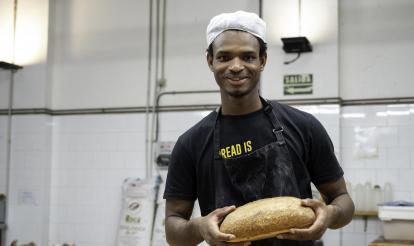
17.10.25
8 minutes readAt four in the morning, while the city sleeps, Djogo Barri arrives punctually at the Panic bakery workshop. This 22-year-old has found more than just a job in the world of artisan bread; he has discovered a path towards greater independence and stability. His achievement is one of the almost 25,000 successes made possible in 2025 through the Incorpora programme of the ”la Caixa” Foundation, in collaboration with social organisations such as the San Juan del Castillo Foundation and thousands of committed companies.
The working day at the Panic bakery begins with mathematical precision. Djogo identifies and labels each package, distinguishes between eight different types of bread – some sliced, others whole – and prepares the delivery of orders destined for restaurants in Madrid. “I like this job,” the young man explains. “I have to stay focused and make sure each delivery reaches the right restaurant. I feel good when we manage to do it without any problems.”
When Djogo started working at the bakery two years ago, he knew nothing about the world of bread. Originally from Guinea Conakry, he left his country while still in secondary school.
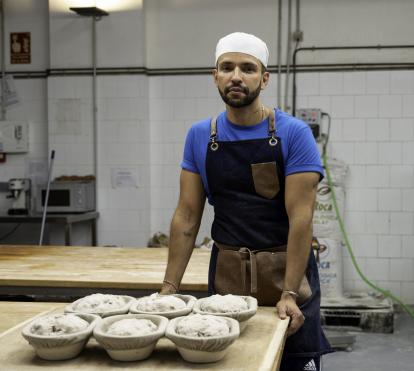
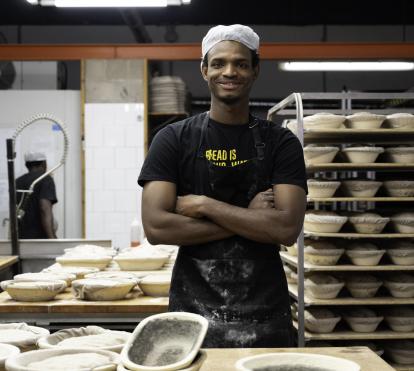
Although he completed basic training in electricity in Spain and is very interested in renewable energy, his entry into the job market came through this bakery, where he is now in charge of deliveries. “It’s a job that demands a lot from the employee,” explains Gean Carlos Sallas, the bakery’s coordinator. “You have to wake up at three in the morning, be here at four on the dot, do a lot of calculations and pay close attention.”
Djogo admits he knew “practically nothing” about how a delivery system works. As part of his integration pathway, he was enrolled on a course in which Gean used a method similar to going to school. “Each day, I sent him home with homework, simulations of deliveries he had to work out,” he explains. “He would bring them back the next day and I corrected them: this is right, this is wrong, this is so-so… That’s how he became familiar with the job, and today he’s one of the best delivery workers we’ve ever had.” This training effort requires patience, and Djogo himself considers it as essential, since in the early days he arrived at work with some fear. “They taught me little by little and I gradually got used to it – it’s all been thanks to their help,” he confesses.
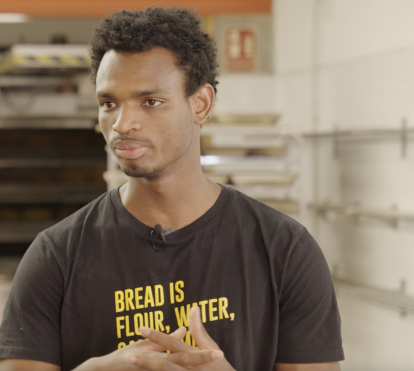
Since its launch in 2006, the Incorpora programme of the ”la Caixa” Foundation has built partnerships between companies and social organisations to offer opportunities to groups facing barriers to employment: people with functional diversity, young people at risk of exclusion, women who are survivors of gender-based violence, and other vulnerable groups. In 2025 alone, it has supported 79,792 people.
This work is only possible thanks to the 1,032 specialists from the 413 social organisations that collaborate with the programme, designing personalised integration pathways for each case. Djogo benefited from one of these, which included career guidance, emotional support, legal advice and training, all provided through the Pueblos Unidos – San Juan del Castillo Foundation. “They gave me all their support and guidance, taught me how to prepare a CV and how to face a job interview,” recalls the young man.
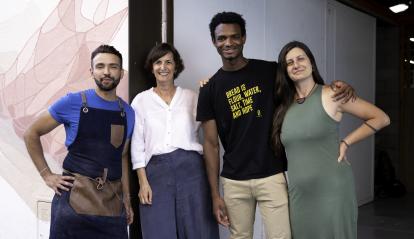
Candela Cortina, an employment guidance specialist at the organisation, highlights the importance of that preparation: “We work so that he himself can identify his potential and what he can contribute when in a job,” she explains. “We also analyse what he needs to prioritise in a recruitment process. These are key aspects when it comes to finding employment.”
Training is one of the resources offered by the Incorpora programme. In 2025, 181 courses were delivered, with 2,483 participants, 59% of whom gained employment upon completion. “The focus is on entering the mainstream job market,” Cortina explains. “Once you’ve built up some work experience, regularised your administrative situation and covered your basic needs, the real interests of each person begin to emerge.”
The success of this training lies in its ability to meet the real needs of companies. It offers specific technical content tailored to various trades, work placements in companies and reinforcement of the personal skills essential for finding and keeping a job. “Companies don’t just value technical knowledge,” Cortina emphasises, “but also attitude, eagerness to learn, punctuality and the ability to get along with the rest of the team.”
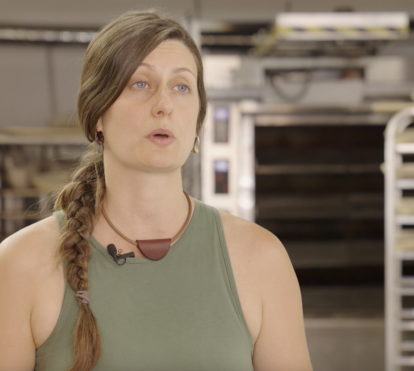
As an employment and social integration programme, Incorpora would make little sense without the involvement of thousands of companies. In 2025, a total of 10,723 businesses across Spain collaborated with the project, making 31,086 job placements possible. These are organisations that have not only discovered talent but also actively contribute to building a fairer society. “Companies are often spoken about as if they were abstract entities,” stresses Natalia Padrón, a specialist in business outreach and collaboration at the San Juan del Castillo Foundation. “But they’re made up of people and are a key player in driving social change and justice.”
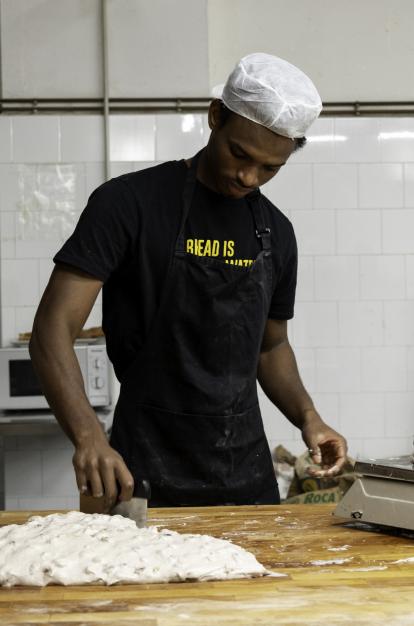
The smooth relationship between social organisations and the private sector is another cornerstone of the programme’s success, as the case of Panic demonstrates. The collaboration between the company and the foundation dates back to 2015, when the first training courses for artisan bakery assistants were launched. Gean appreciates the work of the foundation’s specialists: “They get involved to make sure everything goes perfectly, keeping track throughout the whole process and asking how things are going with this or that person.” For the foundation, “Panic has not only been a training centre, but has also enabled many job placements for people who have then remained in employment,” Padrón stresses.
Job stability is particularly significant in a context where staff turnover can be high. “Djogo has brought consistency to this role,” acknowledges Gean. “We used to have a lot of issues with delivery drivers. He always arrives on time and does his job very well.”
But the value of companies like Panic goes beyond simply offering jobs. The multicultural atmosphere of the bakery highlights another dimension of the programme: the building of diverse and inclusive communities. “We’ve got six African workers, one Italian, and me, I’m Brazilian, and the truth is we get along really well,” says Gean. “If you don’t grow fond of the people you work with, you’ve got no heart, because you live alongside them every day.” For Djogo, this atmosphere makes his working day more than just a way of earning money: “As well as working together, we’re good mates – we’re very close and understand each other really well,” he says.
According to Padrón, this diversity within the workforce is “a source of enrichment, because people of foreign origin bring with them the knowledge they’ve acquired both in their host country and in their country of origin, as well as different perspectives for solving problems.”
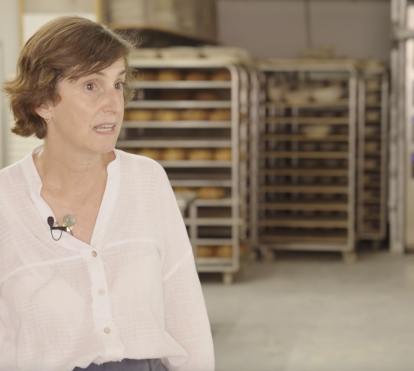
It is midday and Djogo is finishing his working day while Panic’s deliveries reach their destination. The process of making and distributing bread is a fitting metaphor for the work carried out in this programme of the ”la Caixa” Foundation. “Bread is made in different cultures and civilisations, in different shapes and forms,” observes Padrón. “It’s manual work where the kneading matters, and timing is crucial. For me, that illustrates everything that the migration and employment and social integration process represents.”
Djogo says goodbye to his colleagues without knowing what he will do with the rest of the day. A boxing enthusiast, he may go to training or perhaps meet up with a friend. In any case, he can now enjoy his free time without the worries he had in the past. “I try not to focus too much on the future, but to stay centred on the present,” he says. “I don’t know what tomorrow will bring, but right now I’m here, and I’m doing well. I’m happy.”
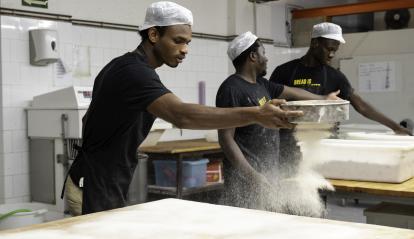
The ”la Caixa” Foundation joins the International Day for the Eradication of Poverty with the commitment to offer opportunities to those who need them most. Through its programmes, it promotes social and educational initiatives to break the cycle of poverty, exclusion and inequality, and to advance towards a fairer and more inclusive society.
In a day like today, Djogo’s story, Panic’s commitment and the tireless work of the San Juan del Castillo Foundation under the umbrella of the ”la Caixa” Foundation’s Incorpora programme serve as a reminder that employment is far more than just a source of income. It is a powerful tool for giving people dignity, fostering their independence and breaking the cycle of poverty. Employment inclusion not only transforms individual lives but also builds fairer, more equitable and more prosperous societies.